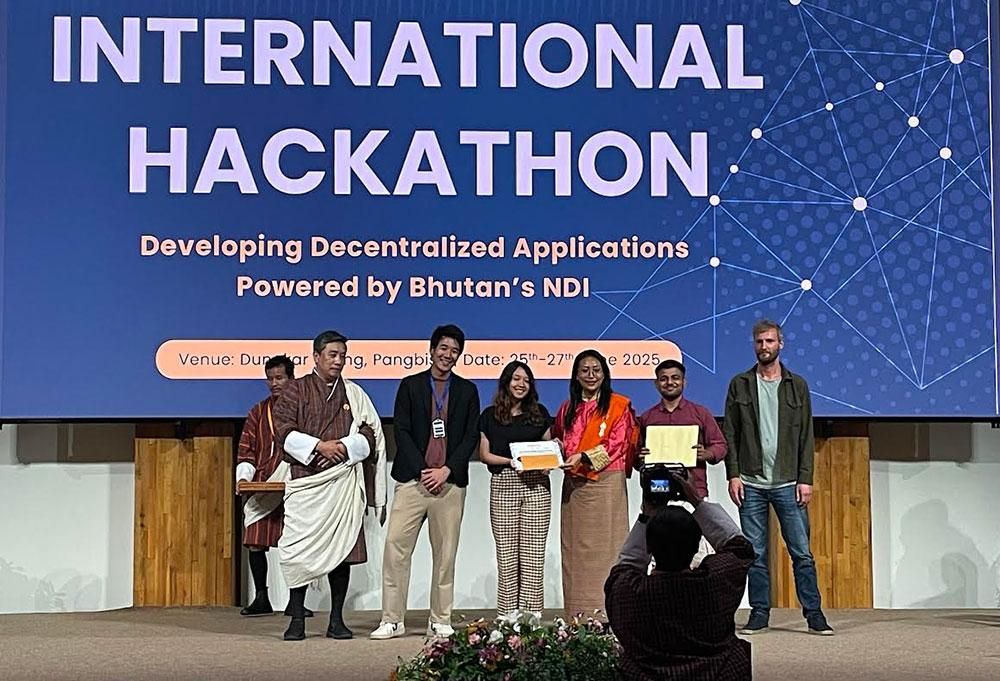Bhutan’s hackathon throws up 13 innovative solutions around decentralised ID
By Si Ying Thian
GovTech Bhutan, who organised the country’s first international hackathon, would be making the solutions open-source under permissive licences.
-1751269187238.jpg)
GovTech Bhutan has kept the hackathon open, with its only key requirement to ensure that solutions leverage Bhutan NDI or other decentralised tech like blockchain, zero-knowledge proofs and self-sovereign identity (SSI). Image: Canva
Leveraging its world-first decentralised digital ID, Bhutan welcomed 13 innovative solutions to improve public service delivery.
These ranged from tools designed to combat land fraud and streamline migrant worker compliance, to platforms for authenticating and trading artisan products and public listening.
The solutions were a culmination of the country’s first international hackathon, which took place from June 25 to 27 in Paro, Bhutan. Both local and international participants took part in the event to develop apps and tools on top of Bhutan National Digital Identity (Bhutan NDI).
The hackathon was organised by GovTech Bhutan with support from the Ethereum Foundation, a non-profit organisation based in Switzerland with the mandate to support the growth and development of the Ethereum blockchain.
According to a GovTech Bhutan’s official, as cited in the national newspaper Kuensel, the key requirement of the hackathon was to ensure that solutions leverage Bhutan NDI or other decentralised technologies like blockchain, zero-knowledge proofs and self-sovereign identity (SSI).
To subscribe to the GovInsider bulletin, click here.
Integrating crowdsourced solutions into public sector
Three out of the 13 teams who took part in the hackathon were international, and the teams comprised a total of 70 participants.
The two winning teams secured BTN$250,000 (S$3,819) worth of funding support from the Ethereum Foundation to refine their minimum viable products (MVPs).
The solutions were assessed by an expert panel based on innovation, usability, and real-world impact.

The two winning teams were a local team Cyberchain who developed an app connecting Bhutanese artisans to buyers, and an international team DeepGov with an artificial intelligence (AI)-powered survey app for anonymous citizen feedback to boost civic participation in policymaking.
The winners would receive priority support to further develop the app at the TechPark Incubation Centre in Thimphu, according to Bhutan’s national TV broadcaster BBS, as well as to work with GovTech Bhutan to integrate the solutions into public services.
All participating teams would also receive BTN$500,000 worth of funding via the incubation centers at the Department of Employment and Entrepreneurship, under the Ministry of Industry, Commerce and Employment.
International expertise and open source solutions
Over three days, the teams were supported by seven professional mentors. Four mentors traveled from abroad, including the US and India, and three local mentors from Bhutan NDI and Cloud Bhutan complemented them with deep local expertise.
This hackathon was built on the local National Tech Hackathon organised by GovTech last year in March, and last year’s three winning teams joined the current hackathon.
Ethereum Foundation’s President, Aya Miyaguchi, as reported in BBS, said that the international event was designed to help Bhutanese developers to connect with international networks and opportunities in the decentralised identities space.
According to Kuensel, the GovTech Bhutan’s official highlighted that the codes for all hackathon projects would be open-sourced to the public via the GitHub repository.
The agency also intended to make the solutions from its digital innovation programmes open-sourced under permissive licences like MIT or Apache 2.0.
Permissive licences meant that other users could use, modify, and distribute the software.
These innovations would also be showcased globally within the digital ID and blockchain communities.
BBS reported that GovTech Bhutan has stated that besides the winners, any “promising app” could qualify for incubation support by the government.
GovTech Bhutan is looking to ramp up the use cases of Bhutan NDI by integrating 15 more government services, on top of the 13 as of this February.
You can find other articles written about GovTech Bhutan here.